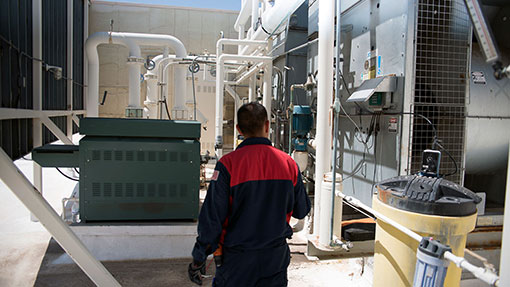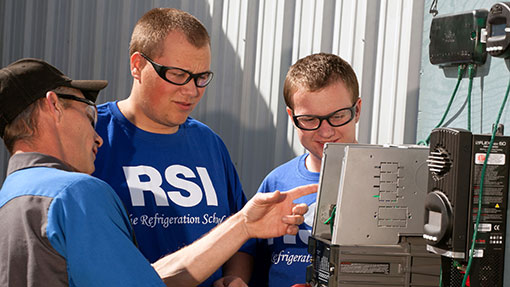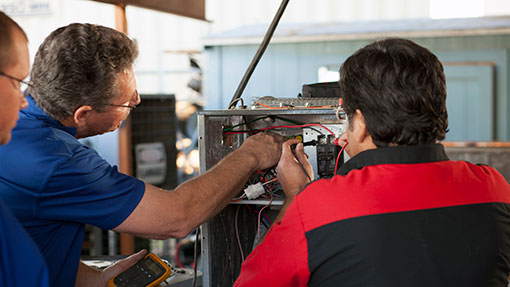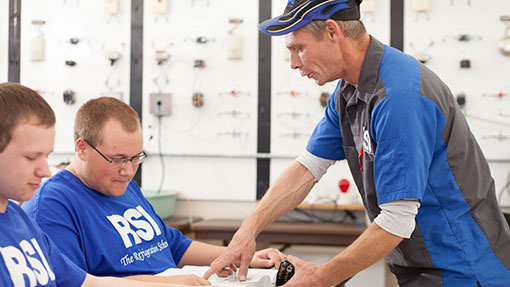Electro-Mechanical Technologies Training
Duration: 9 Months
RSI is the right choice
HVAC/R Training Since 1965
Graduates Placed in all 40+ States
Graduates initially employed in 44 states according to our ACCSC Annual Report data for reports dated 7/1/18 – 7/1/2023
Over 10,000 Graduates¹
Upcoming Class Start Dates
| Class | Location | Date |
|---|---|---|
| Classes Start | Phoenix, AZ | 08/14/2024 |
| Classes Start | Phoenix, AZ | 09/12/2024 |
Class Schedules
| Morning (M-F) | Afternoon (M-F) | Evening (M-F) |
|---|---|---|
| 7:30am-12:30pm | 12:45pm-5:45pm | 6:00pm-11:00pm |
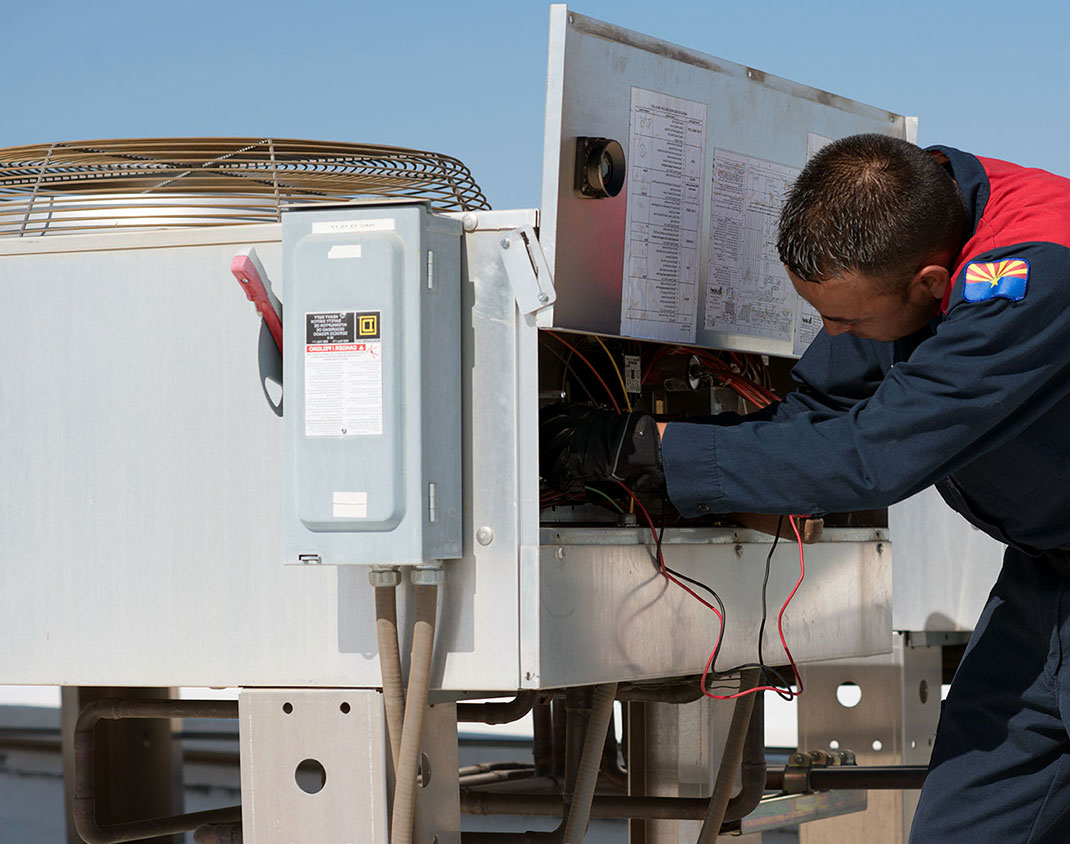
This 9-month program provides training based on a broad range of knowledge in electrical and mechanical technologies, along with heating, ventilation, air conditioning and refrigeration.
Courses focus on the fundamentals of electricity, residential and commercial wiring, and comfort systems. An added value to the electromechanical technician training is the solar energy technology module which features an overview of the Photovoltaic (PV) Science with principles and application processes used in many solar powered systems.
- Day and evening classes available
- Can be completed in as little as 9 months
- Incorporates real world training with hands-on curriculum
- Includes a Fundamentals of Solar course
All it takes is 9 months
Climate control and refrigeration is almost everywhere, and trained installation, service and maintenance technicians can get their start in the Electro-Mechanical Technologies program at RSI. Plus, gain skills and experience in the Solar Principles and Applications module with an introduction to the fundamentals of solar energy. Possible job opportunities include:
- HVAC/R Technician
- Power Plant Field technician
- Facilities Maintenance Engineer/Technician
- Maintenance Electrician
- Boiler Operator
- Commercial Service Technician
- Air Conditioning Technician
- HVAC Service Technician
- Refrigeration Service Technician
- Commercial Refrigeration Technician
- Low-Temperature Field Technician
- Restaurant & Retail Refrigeration Technician
Employment is Expected to Grow for HVAC/R in the US by 37,700 Jobs by 2032!i
Flexible Class Schedules
Class schedules range from morning, afternoon and evening, depending on the program and campus location. RSI offers flexible schedules whether you are just graduating from high school, changing your career, or transitioning from military to civilian life. We work hard to find the right program and the right schedule to help you succeed. Contact us for more information on upcoming class times and start dates for the Electro-Mechanical Technologies program.
Request More Info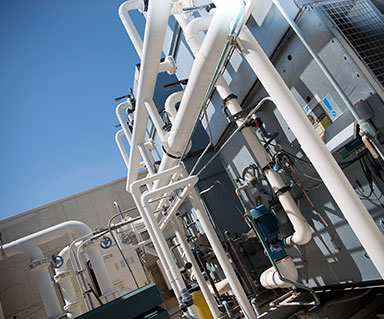
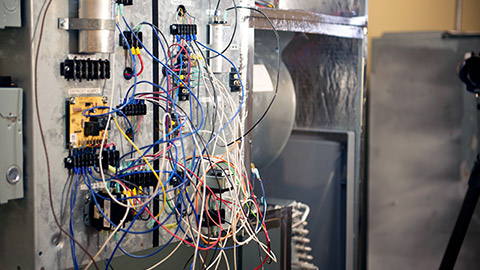
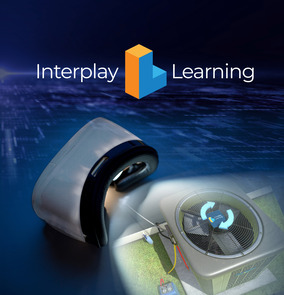
Students Get a Meta Quest 2 loaded with Access to Interplay Virtual Reality Training!
Train anywhere. Anytime.
Students of the Electro-Mechanical Technologies Training program will have the Interplay Learning virtual reality training simulator available to enhance skills learned. Interplay simulates the experience of Electrical, HVAC training via VR to help students learn trouble-shooting techniques, even when they’re away from school. A Meta Quest 2 is part of the gear package for this program and Interplay Learning is included as part of the course materials for all students.
Program Courses
Fundamentals of Electricity
This HVAC/R class provides The Refrigeration School students with basic electrical understanding from an elemental stage through troubleshooting. Trainers are used to teach schematic wiring as well as test meter usage along with all the safety processes associated with handling electrical systems such as grounding and energized circuits. Students will work with dual voltage systems commonly found in HVAC/R equipment.
The foundation for control circuit wiring and high voltage wiring are discussed and students will put their knowledge to use while working with the trainers. The training material in this HVAC/R class includes information on multiple types of test meters and their proper use, electrical devices, control devices, and troubleshooting. A study of single phase and three phase motors round out the students’ understanding of basic electrical principles.
HVE100
- 4 Semester Credit Hours
- 90 Lecture Hours
- 10 Lab Hours
- 100 Total Contact Hours
- 14.5 Outside Prep Hours
Fundamentals of Solar
This module provides an overview of photovoltaic (PV) science and an introduction to the fundamentals of solar energy. Through a combination of lecture, problem solving and hands-on lab exercises, students will learn the concepts and processes of photovoltaic systems, including their design and installation. The module covers the scope of solar energy systems’ conceptual, mechanical and electrical design, with an emphasis on wiring and electrical issues.
HVE110
- 4 Semester Credit Hours
- 60 Lecture Hours
- 40 Lab Hours
- 100 Total Contact Hours
- 9.5 Outside Prep Hours
Electrical Wiring – Residential
This course introduces the most current version of the National Electrical Code Book to the students as a guide throughout the class. The primary goal of the program is to teach basic techniques of Residential wiring from the standpoint of interpreting all code book requirements. Students will put into practice all that they have learned by wiring a scaled down three bedroom home. A study of electrical safety is provided to ensure a complete understanding of hand tools, ladders, shock hazards, and the personal protective equipment required to work in this field. They will be required to safely place all wiring, circuits, switches, receptacles, lighting fixtures, and GFCI devices in the trainer according to the electrical code.
HVE120
- Prerequisite Course(s): HVE100
- 4 Semester Credit Hours
- 60 Lecture Hours
- 40 Lab Hours
- 100 Total Contact Hours
- 15 Outside Prep Hours
Electrical Wiring – Commercial
The Commercial wiring course follows through with concepts learned in the Residential wiring course of training delving deeper into the National Electrical Code book. Students will be tasked with code book interpretation through the study of load calculations, blue print reading, cost estimating, three phase motor wiring, and conduit manipulation. Students will wire commercial lighting and three phase motors as they research the required applications. A mock commercial building will be wired by students in accordance with applicable code using conduit to protect their wiring.
HVE130
- Prerequisite Course(s): HVE100
- 4 Semester Credit Hours
- 60 Lecture Hours
- 40 Lab Hours
- 100 Total Contact Hours
- 20 Outside Prep Hours
Fundamentals of Refrigeration
In this HVAC/R class, The Refrigeration School students are introduced to the refrigeration cycle through class lecture and observing operating equipment. The material in this class is mechanical in nature and is limited to the mechanical and physical properties of refrigerants and the refrigeration cycle. The equipment in this class is used to safely demonstrate the varied states of refrigerant as it cycles through the system. The student will be introduced to many of the tools associated with the refrigeration industry such as: manifold gauge set, vacuum pumps, service wrenches, charging, and recovery equipment. The safety programs in this class will provide students with details on being in close proximity to rotating machinery and refrigerant handling. The class is also designed to familiarize the student with details on the mechanical troubleshooting process.
HVR100
- 4 Semester Credit Hours
- 90 Lecture Hours
- 10 Lab Hours
- 100 Total Contact Hours
- 8 Outside Prep Hours
Comfort Systems – Residential
This HVAC/R class offers experience with residential split systems, packaged heat pump systems, air conditioners, gas furnaces, and evaporative coolers. The Refrigeration School students are tasked with building schematics for air conditioning/heating systems and wiring the same systems having only the components of the system as reference. A further study of mechanical and electrical troubleshooting turns more hands-on in this class as students see the equipment come to life by their own hand. Gas piping, sizing, and installation are studied as it applies to furnace operation.
HVR110
- Prerequisite Course(s): HVE100, HVR100
- 4 Semester Credit Hours
- 60 Lecture Hours
- 40 Lab Hours
- 100 Total Contact Hours
- 6 Outside Prep Hours
Comfort Systems – Commercial
This HVAC/R class offers a more technical approach to studying the concepts of indoor climate control. The Refrigeration School students are tasked with safely removing and replacing components within residential and commercial HVAC systems such as fan motors, fans, electrical components, and compressors. Recovery and charging of refrigerants are an integral aspect of this class and students will apply their lessons to real equipment to round out the experience. Students will study brazing techniques using oxy/acetylene equipment and are required to put their knowledge to use on multiple tasks designed to enhance understanding of working within the confines of an HVAC unit. Refrigerant piping manipulation is introduced for study using hands-on techniques as students gain an overall familiarization of HVAC equipment. The opportunity to study and test on R410a and automotive air conditioning is provided in this class; successful students will achieve an R410a safety certification and EPA section 609 certification. An introduction to air balance and the associated equipment are also included for this class.
HVR120
- Prerequisite Course(s): HVE100, HVR100
- 4 Semester Credit Hours
- 60 Lecture Hours
- 40 Lab Hours
- 100 Total Contact Hours
- 20 Outside Prep Hours
Refrigeration Systems and Practices
Students will learn to maintain, monitor, and manage residential and commercial grade walk-in refrigerators and freezers. A study of commercial grade ice makers such as: a flaker, cuber, and nugget type units provide an intense look at low temperature refrigeration equipment. The Refrigeration School students will be required to change out a compressor, service and/or repair critically charged systems to enhance their overall understanding of mechanical and electrical troubleshooting. A variety of specialty tools related to equipment studied in this class will be introduced to round out the total experience.
HVR130
- Prerequisite Course(s): HVE100
- 4 Semester Credit Hours
- 60 Lecture Hours
- 40 Lab Hours
- 100 Total Contact Hours
Advanced Troubleshooting Techniques
The HVAC/R class introduces the operation and maintenance of reciprocating liquid chillers and stands as a review of the knowledge The Refrigeration School students have attained through previous courses. Electrical troubleshooting takes on a new intensity in this class as students are exposed to the E-STAR Trainer. The E-STAR Trainer is equipment developed by The Refrigeration School to teach and hone electrical troubleshooting skills. A thorough study of mechanical troubleshooting and schematic wiring will raise the student to the level of technician. The opportunity to qualify for EPA section 608 certification is provided during this class. The overall goal of this class is to ensure students have attained the required skills to be successful entry level HVAC/R technicians.
HVR200
- Prerequisite Course(s): HVE100
- 4 Semester Credit Hours
- 70 Lecture Hours
- 30 Lab Hours
- 100 Total Contact Hours
- 15 Outside Prep Hours
Sound Interesting? Contact us for more information on this course and the Electromechanical Technician program below.


